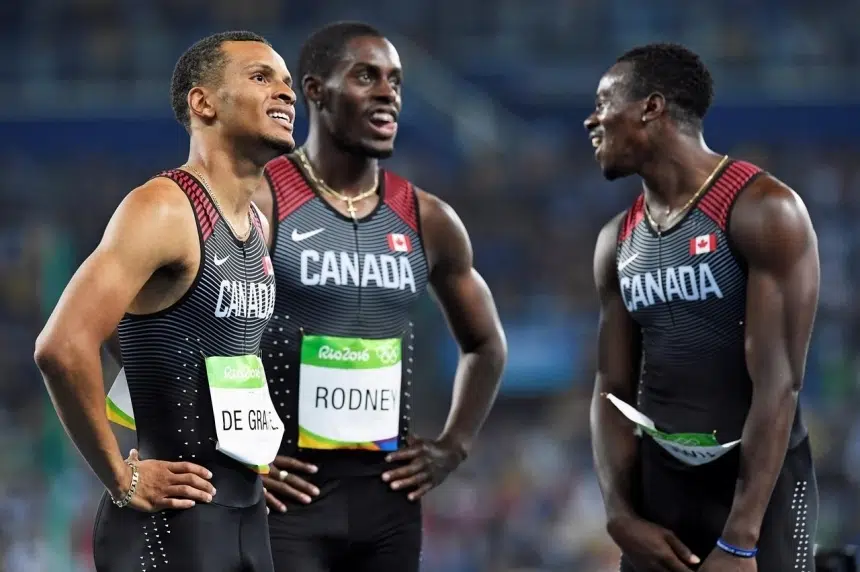RIO DE JANEIRO — It wouldn’t be a 4×100-metre relay without some Canadian controversy.
The Canadians claimed a bronze medal in the event Friday at the Rio Olympics, getting elevated to the podium after the U.S team was disqualified for an illegal baton exchange. Andre De Grasse ran a blistering anchor leg for Canada and picked up his third medal of the Games.
It was a similar scenario at the 2015 IAAF World Championships, where another American disqualification gave De Grasse and Canada a bronze medal.
But Canada has often found itself on the other side of 4×100 disputes. The 2012 Olympic team went from elated to inconsolable in the span of a few minutes, when a bronze medal was revoked when a lane judge ruled one of the runners had stepped on the line.
The team was also disqualified at the 2014 Commonwealth Games, 2015 relay championships and 2015 Pan American Games.
Canada found out about the upgrade while they were in the middle of a live television interview on CBC.
“We were doing an interview, we were looking at the race on the video and talking about getting fourth with a national record. Turned out we got a bronze, so it changed our reaction a lot,” said Aaron Brown, who ran the third leg.
The United States appealed the decision.
The relay capped an eventful Day 14 for Canada at the Rio Olympics, as the country’s women’s soccer team and rider Eric Lamaze celebrated bronzes, while race walker Evan Dunfee saw his hopes for a podium finished dashed twice.
Canada enters the final two days of competition with 21 medals (four gold, three silver, 14 bronze), good for 10th in the overall medal standings. The goal heading into Rio was 19 medals and a top-12 finish.
De Grasse teamed with Akeem Haynes of Calgary, Brendon Rodney of Brampton, Ont., and Brown of Toronto to finish in 37.64 seconds, breaking the Canadian record of 37.69 set by the gold-medal winning team anchored by Donovan Bailey at the 1996 Atlanta Olympics.
De Grasse also picked up a silver medal in the men’s 200 metres and a bronze in the marquee 100 metres in Rio.
“When we came fourth, it was a little bit disappointing. When we got the upgrade to bronze, that cheered our spirits up and we started smiling, and saying ‘Thank God that it happened,'” De Grasse said.
Jamaica finished first in 37.27 seconds, giving superstar Usain Bolt his ninth Olympic gold medal. Japan was second in 37.60.
Earlier, the Canadian women’s soccer team completed an emotional, memorable Olympic journey that saw them win five games and knock off four top-10 teams en route to the medal podium for the second straight Games.
The final step was a nailbiting 2-1 win over Brazil with goals from teenager Deanne Rose and captain Christine Sinclair — in the 25th and 52nd minute, respectively — enough to survive a 79th-minute strike by Beatriz in a game played before a sea of yellow and green at Corinthians Arena.
The 10th-ranked Canadians returned to their winning formula — defending well and being opportunistic on attack. Eighth-ranked Brazil threatened on set pieces but was unable to break down the Canadian backline with one exception.
That came when a flick-on from a throw-in found Beatriz, who turned and knocked it in, bringing the crowd to its feet and restoring hope for the home side.
“The place was just vibrating when Brazil scored that goal,” said Canadian coach John Herdman. “We always do things the hard way. We keep people on the edge of our seats. But there was just an inner belief that it was going to happen today. I think these girls were very clear what they wanted to do.”
An emotional Sinclair, fighting back tears at the post-game news conference, detailed the mission.
“We set a goal to achieve back-to-back podiums and that’s what we did. We weren’t going to settle for anything less than that.”
The late goal made for a tense ending with Brazil playing all-out attack and Canada defending like their lives depended on it. The loud crowd of 39,718 tried to roar their team on but the Canadians refused to break.
They rushed the pitch to celebrate while the crowd, never wavering in its support, chanted for its team. Sinclair, for so long the face of Canadian soccer, was sobbing as organizers set up the podium for the medal presentation.
In equestrian, Lamaze and his brown mare Fine Lady 5 knocked down one rail — the only one they missed in the entire Olympic competition — to finish third in a jump-off in individual show jumping at the Rio Olympics.
It’s the second Olympic medal for the Schomberg, Ont., rider, who won gold eight years ago in Beijing aboard Hickstead, his beloved stallion who died of an aortic rupture in 2011.
“It feels incredible,” said Lamaze. “It was a lot of work. First with the jump-off for the team medal that we missed out on and then me leading all the way and the second round today was massive.”
It was far from an incredible day for Dunfee who experienced the heart-breaking disappointment of finishing fourth, the euphoria of winning a bronze medal and the gut-wrenching reality of having that medal taken away.
Dunfee’s gutsy performance in the men’s 50 kilometres was among Canada’s best in race walking. But that won’t make the ordeal any easier for the 25-year-old from Richmond, B.C.
Dunfee originally finished fourth behind Japan’s Hirooki Arai. But Athletics Canada protested the result because Arai bumped Dunfee with less than two kilometres to go, causing the Canadian to break stride.
Officials sided with the Canadians, disqualifying Arai and promoting Dunfee from fourth to third.
“Immediately after the race, upon urging from our on-site staff, the technical delegate reviewed video, judged there was an infraction and awarded Evan Dunfee bronze and disqualified the Japanese athlete,” Athletics Canada said in a statement.
But Arai filed a protest to the jury of appeals and officials overturned the disqualification, restoring the Japanese racer to the bronze medal position and relegating Dunfee back to fourth several hours after the race ended.
In the men’s BMX final, it took about 35 seconds for the top BMX riders to make it around the track. Tory Nyhaug. from Coquitlam, B.C., had his fate was essentially sealed just two seconds into the race.
Nyhaug was slow out of the gate and it proved costly as he settled for a fifth-place finish at the BMX Olympic Centre. The 24-year-old Nyhaug furiously tried to make up ground but couldn’t get close to the front-runners.
“Everybody is riding really tight,” said Canadian high-performance director Jacques Landry. “The top four obviously raced a flawless race and there’s no way around them.
“So if you miss your gate start or you’re just a bit off, you’ll have to pay for it.”
Halifax’s Mark de Jonge advanced to the final of the men’s 200-metre singles kayak event at the Rio Olympics, but the spot didn’t come without drama.
A photo finish was needed to determine who grabbed the fourth and final qualifying spot in his semifinal, which was stacked with several of the fastest paddlers. Canada’s women’s K4 500-metre team is also in medal contention after qualifying to Saturday’s final.
Vincent Riendeau of Pointe-Claire, Que., qualified for the next round in men’s 10-metre platform event finishing 14th. Maxim Bouchard of Saint-Constant, Que., finished 19th, qualifying him as a reserve for the next phase.
In women’s golf, Brooke Henderson of Smiths Falls, Ont., shot a 4-over 75 to fall into a tie for eighth, while Hamilton’s Alena Sharp went 3-over 75 and is tied for 34th. The final round is on Saturday.
Melanie McCann of Mount Carmel, Ont., was the top Canadian in modern pentathlon, finishing 16th. Toronto’s Donna Vakalis placed 33rd.
Toronto’s Melissa Pagnotta lost in the round of 16 in 64-kilogram taekwondo.
The Canadian Press
©2016 The Canadian Press







